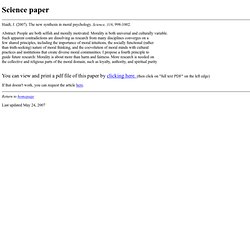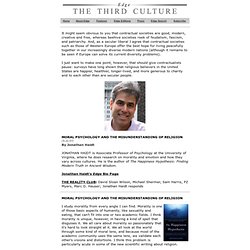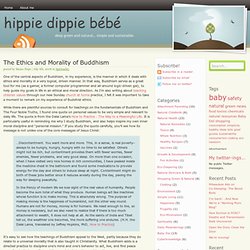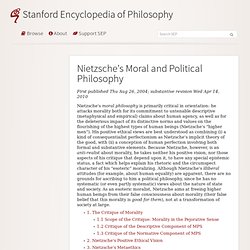

Jonathan Haidt: The moral roots of liberals and conservatives. Jonathan Haidt. Haidt, J. (2007).

The new synthesis in moral psychology. Science, 316, 998-1002. Abstract: People are both selfish and morally motivated. Morality is both universal and culturally variable. Such apparent contradictions are dissolving as research from many disciplines converges on a few shared principles, including the importance of moral intuitions, the socially functional (rather than truth-seeking) nature of moral thinking, and the coevolution of moral minds with cultural practices and institutions that create diverse moral communities. You can view and print a pdf file of this paper by clicking here. MORAL PSYCHOLOGY AND THE MISUNDERSTANDING OF RELIGION: A Talk With Jonathan Haidt. I study morality from every angle I can find.

Morality is one of those basic aspects of humanity, like sexuality and eating, that can't fit into one or two academic fields. I think morality is unique, however, in having a kind of spell that disguises it. We all care about morality so passionately that it's hard to look straight at it. We all look at the world through some kind of moral lens, and because most of the academic community uses the same lens, we validate each other's visions and distortions. I think this problem is particularly acute in some of the new scientific writing about religion. When I started graduate school at Penn in 1987, it seemed that developmental psychology owned the rights to morality within psychology. Furthermore, Damasio and Bargh both found, as Michael Gazzaniga had years before, that people couldn't stop themselves from making up post-hoc explanations for whatever it was they had just done for unconscious reasons. 2) Moral thinking is for social doing.
The Phi Delta Kappan, Vol. 55, No. 9 (May, 1974), pp. 608-610. Philosophical Transactions: Biological Sciences, Vol. 359, No. 1451 (Nov. 29, 2004), pp. 1685-1695. Ethical Theories Compared. The Ethics and Morality of Buddhism. One of the central aspects of Buddhism, in my experience, is the manner in which it deals with ethics and morality in a very logical, driven manner.

In that way, Buddhism serves as a great tool for me (as a gamer, a former computer programmer and all-around logic-driven gal), to help guide my goals in life in an ethical and moral direction. As I’m also writing about teaching children values through our new Sunday church at home practice, I felt it was important to take a moment to remark on my experience of Buddhist ethics. While there are plentiful sources to consult for teachings on the fundamentals of Buddhism and The Four Noble Truths, I found one quote on personal values to be very simple and relevant to daily life. The quote is from the Dalai Lama’s How to Practice : The Way to a Meaningful Life. It is particularly useful in reminding me why I study Buddhism, and also helps inspire my own inner moral discipline and “personal mission.”
…Discontentment. Ethical Decision Making. Nietzsche's Moral and Political Philosophy. First published Thu Aug 26, 2004; substantive revision Wed Apr 14, 2010 Nietzsche's moral philosophy is primarily critical in orientation: he attacks morality both for its commitment to untenable descriptive (metaphysical and empirical) claims about human agency, as well as for the deleterious impact of its distinctive norms and values on the flourishing of the highest types of human beings (Nietzsche's “higher men”).

His positive ethical views are best understood as combining (i) a kind of consequentialist perfectionism as Nietzsche's implicit theory of the good, with (ii) a conception of human perfection involving both formal and substantive elements. Because Nietzsche, however, is an anti-realist about morality, he takes neither his positive vision, nor those aspects of his critique that depend upon it, to have any special epistemic status, a fact which helps explain his rhetoric and the circumspect character of his “esoteric” moralizing. 1. The Critique of Morality. Intro.